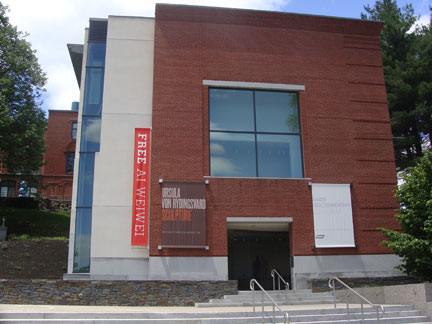DeCordova Joins Global Support for Ai Weiwei
By Kathleen Morrison
Ai Weiwei may be most familiar to the general public as the artist behind the delicate yet industrial Beijing National Stadium, better known as the Bird’s Nest, that glowing edifice that became to the world an icon for the 2008 Summer Olympic Games, but to the art community he is much more.
He is an activist, a visionary, and now, a prisoner in his own country.
Recently New England’s DeCordova Sculpture Park and Museum joined the global movement calling for Ai’s release. Following the example of other institutions such as the Tate Modern, DeCordova has hung on the building’s façade a vibrant red banner with the words, “Free Ai Weiwei” emblazoned in white, and is providing informational materials to its guests. Director Dennis Kois has signed the Solomon R. Guggenheim Foundation’s petition of over 100,000 names, some of them the biggest in the international art community, asking the Ministry of Culture of the People’s Republic of China to free the controversial artist.

A banner outside the DeCordova proclaims, “Free Ai Weiwei.”
A highly vocal critic of government corruption, Ai uses his often provocative art to make a statement, which has set him at odds with Chinese authorities (he eventually distanced himself from the Bird’s Nest as well, criticizing the “pretend smile” he felt China was putting on for the Games). Besides his art, Ai spoke out for human rights through a popular blog he began in 2006. After the government shut it down in 2009, he turned to Twitter.
In an article for The Guardian, writer Hari Kunzru offers one of Ai’s tweets, translated into English, from August 23, 2009: “If there is one person who is still not free, then I am not; if there is one person who still suffers from insult and humiliation, then I do. Do you understand yet?”
While he may have been writing figuratively at the time, the tweet became all too literal for Ai on April 3, 2011.
On that day, while trying to fly out of the Beijing international airport, Ai was detained by Chinese government, and has since been held for over two months without any official charges set against him (although officials have stated he is being investigated for economic crimes). For weeks it was as if he had vanished entirely, until on May 16 his wife Lu Qing was allowed to visit him for the first time in forty-three days. His whereabouts remain unknown to the public today–sixty-seven days after his disappearance.
The protests in defense of Ai worldwide have generally been peaceful, which only serves to more sharply contrast the cruelty Ai has endured at the hands of his government. Prior to being detained, Ai suffered from censorship, physical abuse (an altercation with the police in August 2009 left him with a head injury that eventually led to cerebral hemorrhage and surgery), and vandalism (in January 2011 his newly-built studio was destroyed).
Despite his absence, exhibits of Ai’s work remain on display at London’s Lisson Gallery and the Somerset House, Switzerland’s Foto Museum, and Central Park in New York. Other exhibits are scheduled to open in Austria and Los Angeles, California, later in the year.
While Ai’s works haven’t yet made it to New England (save for the Peabody Essex Museum’s 2009 exhibition Mahjong: Works from the Uli Sigg Collection, which featured several works by Ai among many others from China’s leading contemporary artists), they would not look out of place at DeCordova. Set in Lincoln, Massachusetts, DeCordova Sculpture Park and Museum showcases contemporary sculpture and art in both indoor and outdoor spaces. With a permanent collection of around 3,400 works and new collections rotating in all the time, the museum draws more than 100,000 visitors annually.
DeCordova also hosts classes and workshops for approximately 2,000 students throughout the year, making it one of the largest non-degree granting studio art programs in the region.
“DeCordova is committed to exhibiting high-quality, accessible art of nationally and internationally recognized artists, while also maintaining a strong relationship with established and emerging New England artists,” writes Susie Stockwell, head of marketing and public relations in a press release.
Although the actions of one museum, tucked away in New England, may not free Ai Weiwei alone, DeCordova is proud to stand with art institutes around the world to, as Stockwell writes, “educate visitors and raise awareness of this international injustice.”
Kathleen Morrison is a freelance journalist and graduate student at Boston University working toward her Masters degree.
UPDATE: Ai Weiwei has been released on bail by Chinese police. According to Chinese government news agency xinhuanet.com, Ai’s release came in light of “good attitude in confessing his crimes as well as a chronic disease he suffers from.”
Ai is reported in relatively good health and spirits following his three-month incarceration. Though he has been returned home to his family, Ai will likely be unable to leave the country without permission and must regularly check in with the authorities for the duration of his one-year bail.
“I’m back with my family,” Ai told U.K. newspaper the Guardian. “I am very happy. I’m fine.”
He said he could not comment on his time in detention, adding “please understand”.
